Legendary Italian protean (quick-change) artist Leopoldo Fregoli (1867-1936) was one of the first vaudeville actors who used film in his acts. Fregoli was famous for his rapid transformation acts, in which he did impersonations of famous artistic and political characters.
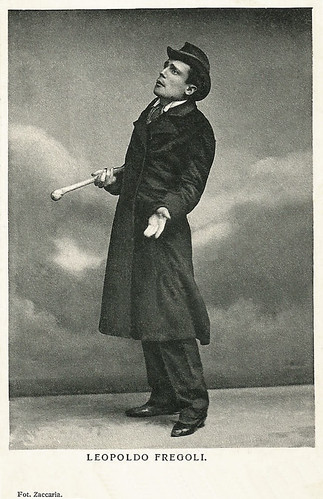
Italian postcard. Photo: Zaccaria.
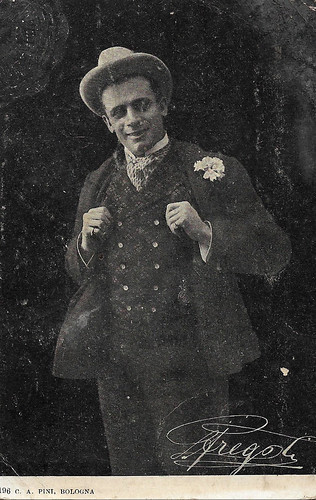
Italian postcard, no. 196. Photo C. A. Pini, Bologna.
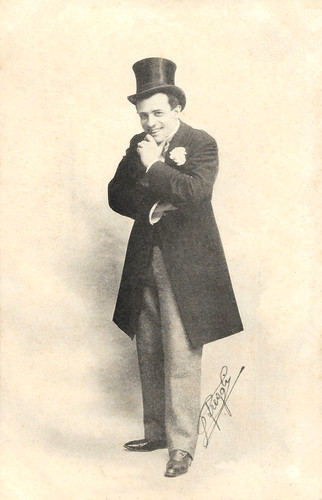
Italian postcard by Garzini e Pezzini, Milano, 1903.
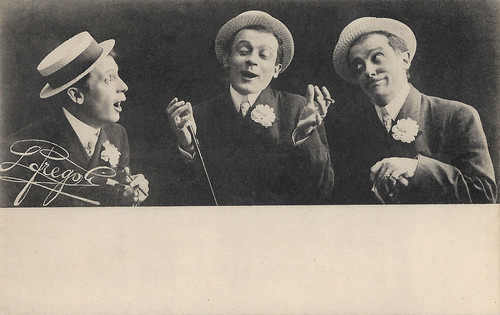
Italian postcard by Garzini e Pezzini, Milano, 1908.

Italian postcard, no. 86. Photo: Sciutto. Sent by mail in 1912.
Leopoldo Luigi Fregoli was born in Rome, Italy in 1867. He was famous in Vaudeville for his rapid transformation acts impersonating famous artistic and political characters.
Originally an amateur entertainer, he took his first steps to professionalism while serving in the Italian army in Abyssinia under General Baldissera in 1890. He soon conquered the Italian and the European stage. From March to May 1897, he was a huge success at the London Alhambra Theatre, despite his lack of speaking English.
While he was performing in London, unkind rumours spread that there was more than one Fregoli. He quickly quashed these rumours by inviting journalists and doubters backstage to see him at work: Fregoli had no secrets.
He knew several imitators in his time, including The Great Trickoli and Fregolina, and offered them advice to improve their performances. He did several tours in South America and Italy and performed a full year at the Paris theatre Olympia, often returning there till 1910. In 1922, Fregoli suddenly stopped his quick-change act in Brazil and returned to Italy.
Fregoli died in 1936. His tombstone carries the words: 'His last transformation'. After him, the so-called Fregoli syndrome is named. Wikipedia describes it: "The Fregoli delusion or Fregoli syndrome is a rare disorder in which a person holds a delusional belief that different people are in fact a single person who changes appearance or is in disguise."
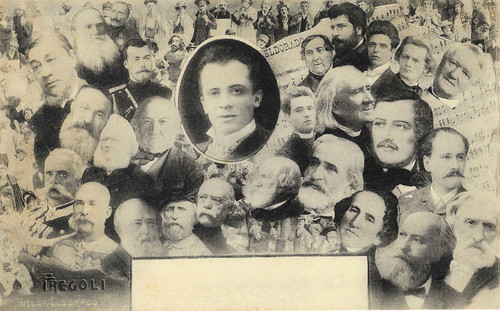
Italian postcard by Garzini e Pezzini, Milano, 1903. Caption: Fregoli nell' Eldorado (Fregoli at the Eldorado).
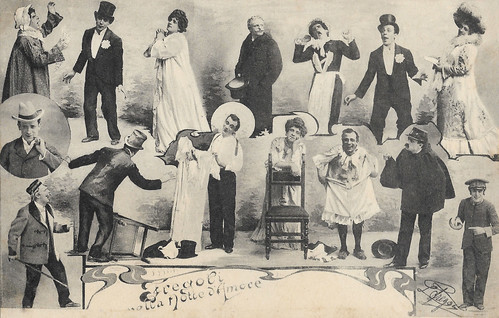
Italian postcard by Garzini e Pezzini, Milano, 1903. Caption: Fregoli nella Notte d'Amore (Fregoli in the Night of Love).
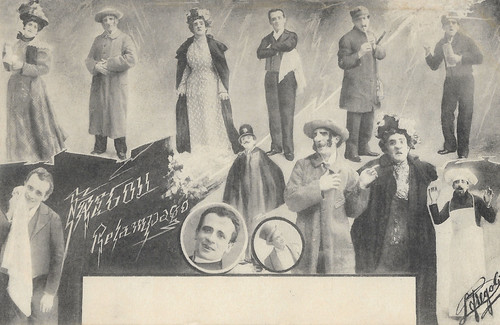
Italian postcard by Garzini e Pezzini, Milano, 1903. Caption: Fregoli Relampago (Spanish for Lightning).
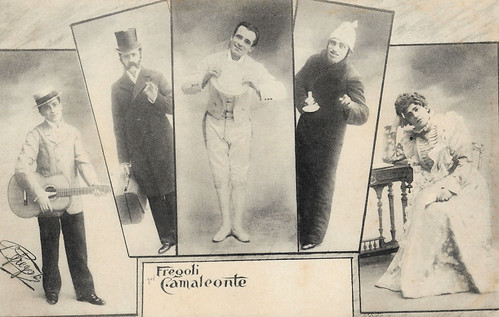
Italian postcard by Garzini e Pezzini, Milano, 1903. Caption: Fregoli Camaleonte (Fregoli Chameleon).
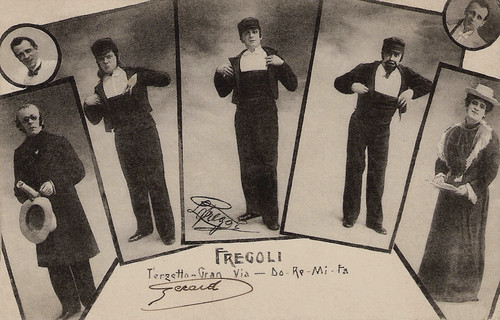
Italian postcard by Garzini & Pezzini, Milano, 1903. This postcard was sent in 1905 in Belgium from Dolhain (Limburg) to Anvers (Antwerp). Double-click to see the postcard completely.
Leopoldo Fregoli was one of the first vaudeville artists to use film. After a visit to Lyon, Fregoli bought a Cinematographe from the Lumière brothers in 1898. He started to show shorts, named Fregoligraph, as part of his stage act. As Luke McKernan writes at Who's Who in Victorian Cinema: "The films were no more than records of his various sketches, though he soon learned the possibilities of film trickery and began to employ surprise cuts and reverses."
Among his films were Danza serpentina/Serpentine Dance (Leopoldo Fregoli, 1897), Fregoli trasformista/Fregoli change-artist (Leopoldo Fregoli, 1898), and Dietro le quinte/Backstage (Leopoldo Fregoli, 1898).
In Maestri di musica/Fregoli, the Protean Artiste (Leopoldo Fregoli, 1898), Fregoli impersonated composers like Verdi, Wagner, and Rossini. In Commendator Ermete Novelli: Impressioni dalla critica/Commander Ermete Novelli: Impressions from the critics (Leopoldo Fregoli, 1899), he imitated the Italian actor and later film star Ermete Novelli.
His act was also filmed by the production company of British film pioneer Robert W. Paul, whose Fregoli, the Protean Artiste, in his Impersonation of Famous Composers (1898), was recorded at the Alhambra. In Georges Méliès' l'Homme-Protée (1899), Fregoli played twenty different characters. Luke Mc Kernan: "His filming was, however, only a brief interlude in an international stage career that lasted many years. Fregoli was a dazzling entertainer whose exuberance and agility are readily apparent from the surviving films."
The Centro Sperimentale di Cinematografia in Rome has several of Fregoli's short films in its collection, which therefore belong to the oldest surviving Italian film material. A late echo of Fregoli's transformations can be traced in Giulietta Masina's character's quick-change act in Luci del varietà/Variety Lights (Alberto Lattuada, Federico Fellini, 1950). Fregoli's memoirs were published by Rizzoli Publishers in 1936, the year of his death, as Fregoli raccontato da Fregoli. Le memorie del mago del trasformismo. At age 69, Leopoldo Fragoli died in 1936 in Viareggio, Italy.
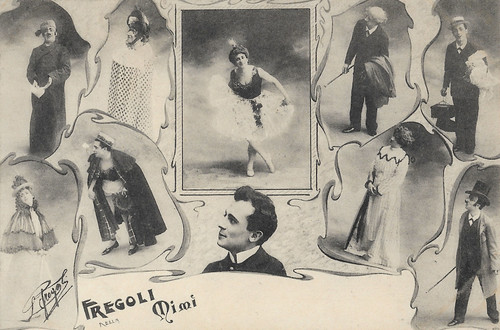
Italian postcard by Garzini e Pezzini, Milano, 1903. Caption: Fregoli nella Mimi.
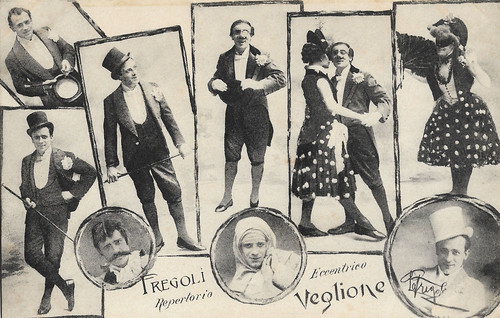
Italian postcard by Garzini e Pezzini, Milano, 1903. Caption: Fregoli repertorio Eccentrico Veglione.
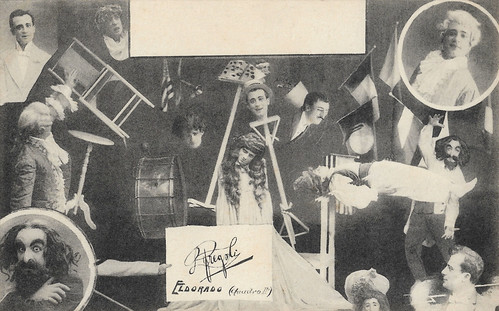
Italian postcard by Garzini e Pezzini, Milano, 1903. Caption: Fregoli in Eldorado.
Curiosanda in Cineteca (Italian). Source: Turifraska (YouTube).
Sources: Luke McKernan (Who's Who in Victorian Cinema), Wikipedia and IMDb.
This post was last updated on 12 April 2024.

Italian postcard. Photo: Zaccaria.

Italian postcard, no. 196. Photo C. A. Pini, Bologna.

Italian postcard by Garzini e Pezzini, Milano, 1903.

Italian postcard by Garzini e Pezzini, Milano, 1908.

Italian postcard, no. 86. Photo: Sciutto. Sent by mail in 1912.
Fregoli syndrome
Leopoldo Luigi Fregoli was born in Rome, Italy in 1867. He was famous in Vaudeville for his rapid transformation acts impersonating famous artistic and political characters.
Originally an amateur entertainer, he took his first steps to professionalism while serving in the Italian army in Abyssinia under General Baldissera in 1890. He soon conquered the Italian and the European stage. From March to May 1897, he was a huge success at the London Alhambra Theatre, despite his lack of speaking English.
While he was performing in London, unkind rumours spread that there was more than one Fregoli. He quickly quashed these rumours by inviting journalists and doubters backstage to see him at work: Fregoli had no secrets.
He knew several imitators in his time, including The Great Trickoli and Fregolina, and offered them advice to improve their performances. He did several tours in South America and Italy and performed a full year at the Paris theatre Olympia, often returning there till 1910. In 1922, Fregoli suddenly stopped his quick-change act in Brazil and returned to Italy.
Fregoli died in 1936. His tombstone carries the words: 'His last transformation'. After him, the so-called Fregoli syndrome is named. Wikipedia describes it: "The Fregoli delusion or Fregoli syndrome is a rare disorder in which a person holds a delusional belief that different people are in fact a single person who changes appearance or is in disguise."

Italian postcard by Garzini e Pezzini, Milano, 1903. Caption: Fregoli nell' Eldorado (Fregoli at the Eldorado).

Italian postcard by Garzini e Pezzini, Milano, 1903. Caption: Fregoli nella Notte d'Amore (Fregoli in the Night of Love).

Italian postcard by Garzini e Pezzini, Milano, 1903. Caption: Fregoli Relampago (Spanish for Lightning).

Italian postcard by Garzini e Pezzini, Milano, 1903. Caption: Fregoli Camaleonte (Fregoli Chameleon).

Italian postcard by Garzini & Pezzini, Milano, 1903. This postcard was sent in 1905 in Belgium from Dolhain (Limburg) to Anvers (Antwerp). Double-click to see the postcard completely.
Fregoligraph
Leopoldo Fregoli was one of the first vaudeville artists to use film. After a visit to Lyon, Fregoli bought a Cinematographe from the Lumière brothers in 1898. He started to show shorts, named Fregoligraph, as part of his stage act. As Luke McKernan writes at Who's Who in Victorian Cinema: "The films were no more than records of his various sketches, though he soon learned the possibilities of film trickery and began to employ surprise cuts and reverses."
Among his films were Danza serpentina/Serpentine Dance (Leopoldo Fregoli, 1897), Fregoli trasformista/Fregoli change-artist (Leopoldo Fregoli, 1898), and Dietro le quinte/Backstage (Leopoldo Fregoli, 1898).
In Maestri di musica/Fregoli, the Protean Artiste (Leopoldo Fregoli, 1898), Fregoli impersonated composers like Verdi, Wagner, and Rossini. In Commendator Ermete Novelli: Impressioni dalla critica/Commander Ermete Novelli: Impressions from the critics (Leopoldo Fregoli, 1899), he imitated the Italian actor and later film star Ermete Novelli.
His act was also filmed by the production company of British film pioneer Robert W. Paul, whose Fregoli, the Protean Artiste, in his Impersonation of Famous Composers (1898), was recorded at the Alhambra. In Georges Méliès' l'Homme-Protée (1899), Fregoli played twenty different characters. Luke Mc Kernan: "His filming was, however, only a brief interlude in an international stage career that lasted many years. Fregoli was a dazzling entertainer whose exuberance and agility are readily apparent from the surviving films."
The Centro Sperimentale di Cinematografia in Rome has several of Fregoli's short films in its collection, which therefore belong to the oldest surviving Italian film material. A late echo of Fregoli's transformations can be traced in Giulietta Masina's character's quick-change act in Luci del varietà/Variety Lights (Alberto Lattuada, Federico Fellini, 1950). Fregoli's memoirs were published by Rizzoli Publishers in 1936, the year of his death, as Fregoli raccontato da Fregoli. Le memorie del mago del trasformismo. At age 69, Leopoldo Fragoli died in 1936 in Viareggio, Italy.

Italian postcard by Garzini e Pezzini, Milano, 1903. Caption: Fregoli nella Mimi.

Italian postcard by Garzini e Pezzini, Milano, 1903. Caption: Fregoli repertorio Eccentrico Veglione.

Italian postcard by Garzini e Pezzini, Milano, 1903. Caption: Fregoli in Eldorado.
Curiosanda in Cineteca (Italian). Source: Turifraska (YouTube).
Sources: Luke McKernan (Who's Who in Victorian Cinema), Wikipedia and IMDb.
This post was last updated on 12 April 2024.
No comments:
Post a Comment